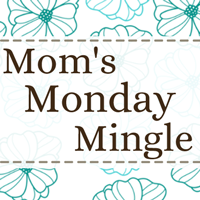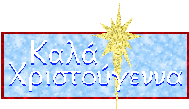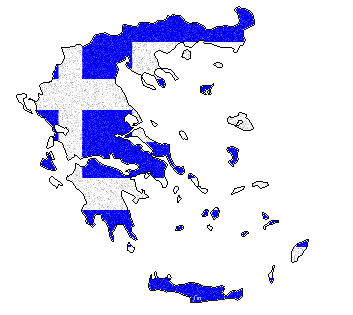How do we celebrate Christmas in Greece? Well, the customs are many and they vary depending on the region so I'm just going to tell you the ones that are mostly common all over the country. First, the Greek Orthodox Church is celebrating Christmas on December 25th, on the same date as the Catholic and Protestant Churches. In Greece when we talk about the "holidays" we are referring to the holiday period of Christmas, New Year and Epiphany on January 6th. |
Christmas remains a quiet, solemn season that is still close to the true spirit of the holiday. It is not very commercialised, yet!
Almost everyone buys and decorates a Christmas tree whether it is real or artificial (Did you see mine?) They are decorated a few days before Christmas and remain in the homes until Epiphany (Jan. 6th).
The Christmas tree though is an 'imported' tradition. Traditionally Greeks would (and still do) decorate a small boat due to Greece’s close affiliation with the sea and it’s long marine history (Greeks have been seafarers for thousands of years and the country is today one of the world’s mightiest shipping nations. Let's not forget, that the country's coastline is 14880km long! As a matter of fact according to the World Factbook Greece, despite its small size, is 10th out of 194 countries with the longest coastline. Remember the Greek beaches! and islands!!!).
The Christmas boats are made of paper or wood, decorated with lights and a few simple ornaments. They are usually placed near the outer door or by the fire and the bow should always point to the interior of the house symbolizing a full load of riches reaching one’s
home.
 |
| Every December, Greece’s second city, Thessaloniki, erects a huge, illuminated metal structure in the shape of a three-mast ship next to the Christmas tree in its main Aristotelous Square. |
While other cultures have Christmas elves, the Greek equivalent is not so benign. We have the mischievous and even dangerous sprites called the Kallikantzari who love to prey upon people and causing a mess during the holidays. (For more info check out this interesting post. )
A very old custom which remains today practically unchanged is the Greek Christmas carols, which is called Kalanda in Greek. They are beautiful carols that have been handed down from Byzantine times and add to the reverent quality of the celebration.
 On the morning of Christmas Eve children go from home to home and sing the Kalanda accompanied by the sounds of metal tinkling triangles, even guitars, or harmonicas. These carols bless the house. In return, they receive sweets and money!
On the morning of Christmas Eve children go from home to home and sing the Kalanda accompanied by the sounds of metal tinkling triangles, even guitars, or harmonicas. These carols bless the house. In return, they receive sweets and money!
Carols are sung on the eves of Christmas, New Year and Epiphany, and they are different for each holiday.
Following is a part of the Greek carols for Christmas:
Following is a part of the Greek carols for Christmas:
"Good day lords
If it's your bidding
Of the Christ's divine birth
I will tell in your manse
In the town of Bethlehem
The heavens rejoice
And all creation delights
In the cave he is born
Within the horse manger
The king of the heavens
And Maker of all . . ."
Would you like to hear
the Kalanta?
|
Christmas and New Year’s are a busy time (like anywhere else) with shopping, baking and preparing for the friends & family that will visit. As Christmas draws near, preparations begin so all will be ready for the big holiday. Houses are cleaned with extra care, and a few days before Christmas the Christmas cookies will be baked. The traditional Greek Christmas cookies, which are found in each
and every Greek home, are the Melomakarona (honey-dipped cookies often stuffed and sprinkled with walnuts) and the Kourambiethes (sweet cookies with almonds and dusted with powdered sugar). The yummy recipes will be posted shortly!!!
 |
| Yes, some melomakarona can be chocolate coated! |
After 40 days of fasting (the holiday is preceded by a time of fasting and even though not everybody observes it those who do, abstain from any meat, dairy or eggs) the Christmas feast is looked forward to with great anticipation by adults and children alike.
On Christmas day, after church services, the family often along with with friends and relatives gather for the big Christmas meal. Every Christmas table includes loaves of Christopsomo ("Christ's Bread") and either a whole roast turkey with a stuffing of rice, minced meat, raisins, cone and chestnuts) or the (more traditional) roast pork, be it a loin, shoulder or even a whole suckling pig as well as other Greek delicacies. The traditional Greek Christmas feast wouldn't be complete without the delicious kourambiethes and melomakarona for dessert!
On Christmas day, after church services, the family often along with with friends and relatives gather for the big Christmas meal. Every Christmas table includes loaves of Christopsomo ("Christ's Bread") and either a whole roast turkey with a stuffing of rice, minced meat, raisins, cone and chestnuts) or the (more traditional) roast pork, be it a loin, shoulder or even a whole suckling pig as well as other Greek delicacies. The traditional Greek Christmas feast wouldn't be complete without the delicious kourambiethes and melomakarona for dessert!
Finally, I should mention about the Name Days! On Christmas Day people named Manolis or Emanuel or Manos or Emanuela, Christos or Christina all celebrate and friends and relatives will stop by to wish them "chronia pola" = "many happy returns". (They also receive presents just like a birthday!)
After Christmas, the children impatiently await the New Year's Day (Protochronia) because it is the custom to exchange gifts then instead of Christmas. That's when St. Basil (Ayios Vasilis=the Greek Santa Claus) delivers their gifts.
Photos are courtesy of Google images and glitter-graphics.com













































How I wish I could grab those Traditional Greek Cookies.... my mouth is watering now.
ReplyDeleteSorry, Natalie I removed your comment by accident. I did read it . Thanks!
DeleteThank you for spreading the Creek Christmas spirit! I loved reading your post. That huge ship in Thessaloniki is like from a fairy tale. I wish we had one here in Athens or better in Piraeus.
ReplyDeleteI LOVE how you celebrate Christmas!!!!! In the USA it has become too commercialized and people have forgotten the true meaning of the day. I think it is so cool that the boat is a popular symbol (the picture is gorgeous) and I love the music--listened to the video you have here--very cheerful music! I'm glad you shared this--it is always interesting to me to see how different countries & cultures celebrate the holidays!
ReplyDeleteI'm really glad my readers find these posts interesting!
DeleteI loved this post! It's so neat hearing the way things are done in other countries. I wish i could experience it!
ReplyDeleteBy the way...my parents met in Crete! They were both stationed there with the US Air Force. They got married while there. Everyone always thinks it's cool that they honeymooned in Athens, not realizing they were living close by. Ha ha!
Jillian
Hi! It's Jilly
Hi! It's Jilly
I'm glad you liked my post. Crete is such a beautiful island! Your parents were lucky to be stationed there!
ReplyDeleteHi! I am glad to have found your blog! I am your newest follower and was kinda maybe sorta hopin' that you would hop on by and follow me back!
ReplyDeleteHappy holidays,
Sarah
www.enjoyingtheepiphany.com
Thanks for following! I'll be right over!
ReplyDeletecool
ReplyDeleteI have a report on Christmas on Greece and this website/blog is really helpful and informational.
ReplyDelete